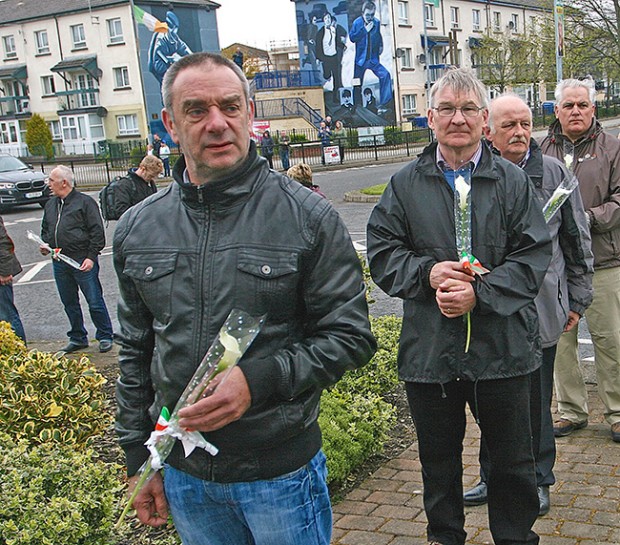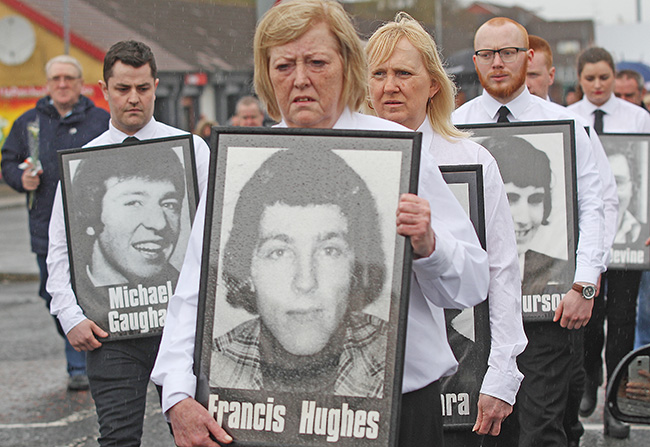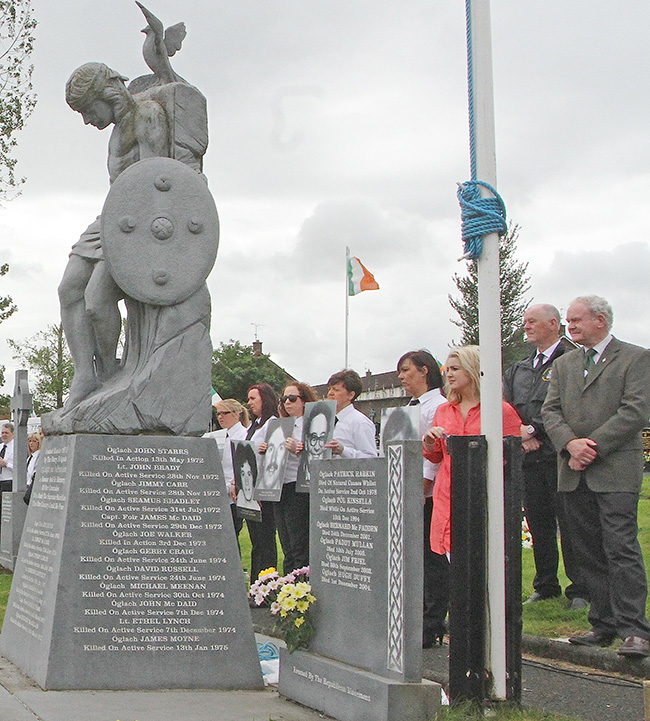6 June 2016 Edition
Derry ex-POWs reflect on prison struggle in new book
The book has been produced by Derry republican ex-prisoners group Tar Abhaile.

• Former POWs laying Easter Lilies at Derry's Hunger Strike Memorial on 1 May this year
The British and unionists are at pains to portray the struggle as a law and order issue, allowing them to evade their political responsibility for the war that raged on our streets
REFLECTIONS of the Prison Struggle 1976-1981 is a recently-released collection of memories and views of former ‘Blanketmen’ from the H-Blocks and women from Armagh recounting their experiences in the North’s prisons during the protest years.
Other contributors to the book are those stalwarts of the Relatives Action Committee such as Martha McClelland and Mary Nelis whose campaigning ensured the British authorities couldn’t brush the ill-treatment they were meting out to protesting prisoners under the carpet of censorship.
While the essays in the book were originally published in the Derry News newspaper as part of a project carried out in partnership with by Derry republican ex-prisoners group Tar Abhaile and the Derry community-led mental health project Cúnamh in 2006, the 25th anniversary of the Hunger Strike, they have only now been collated into book form by Tar Abhaile.
The publication pays tribute to a number of former prisoners who have died since their release. Eamon ‘Bronco’ Bradley was shot dead by the British Army in 1982 while Ciarán Fleming, who was one of the 38 republicans who escaped from Long Kesh in 1983, died on active service on the Border in 1984.
Another, Peter ‘Big Pete’ McCallion, was killed after being attacked and beaten after a night out, while a number of others who died of natural causes are also remembered.
In between the original articles being printed and the book being published, one of the contributors, John Cassidy, has also died.

• Former Armagh POW Lynn O'Connell remembering Francis Hughes
The initial inspiration for the project arose out of research carried out for Cúnamh and published in 2005 in a report titled Blocks to the Future.
Research carried out by Dr Brandon Hamber highlighted the ongoing and long-term psychological and emotional trauma faced by republican former prisoners who participated in the ‘No Wash/Blanket’ protest which preceded the Hunger Strikes.
The two central planks of the Cúnamh research, according to Co-ordinator Cathy Nelis, was to “explore the psychological impact of imprisonment and the coping methods employed” by political prisoners who identified as soldiers. According to Cúnamh, this may have offset the “potential for mental ill-health”.
Cúnamh also wanted to “challenge the policy and political discourses which seek to exclude political prisoners and their families from many spheres of daily life and treat them only as perpetrators whilst ignoring their experiences”.
This contradiction is still at the heart of politics in the North to this day. There is widespread recognition that the prisoners were politically motivated. Their stories of growing up in conflict, experiencing the full force of the Orange State and British Army repression being involved in armed struggle and then facing the “H-Block conveyor belt” of arrest, torture in RUC interrogation centres, the ‘justice’ of a Diplock Court then shipped to the H-Blocks and years of protest and abuse at the hands of unionist prison warders is testament to the nature of the state.
On the other hand the British and unionists are at pains to portray the struggle as “a law and order issue”. This allows them to evade their political responsibility for the war that raged on our streets.
In her contribution, The Long Road to the Hunger Strikes, Martha McClelland recounts how ‘traditional’ republicans were sceptical of what they termed ‘non-republicans’ becoming involved in the H-Block/Armagh campaign, believing they would “dilute” the protests and “take them over for for their own ends and betray the prisoners”.
McClelland, however, maintains that the guarantee that that wouldn’t happen would be the continued activism of republicans.
“The ultimate betrayal of the POWs would be to allow the struggle to be criminalised,” she states.
That statement from 10 years ago is as relevant today, in the 35th anniversary year of the Hunger Strikes, as it was when it was written in 2006 and, of course, during the protest years.

• Pius McNaught (behind Martin McGuinness) of Derry ex-POW group Tar Abhaile who was central to the 'Reflections' project
It is ironic that political ex-prisoners still face discrimination on the basis of their convictions: they are prevented from travel to certain countries, barred from fostering and adopting children, and blocked from earning a living with barriers to employment.
When Traditional Unionist Voice leader Jim Allister succeeded in having his Special Advisers (SPAD) Bill, barring ex-prisoners from holding the job of special political adviser in Stormont, passed in the Assembly (with the connivance of the SDLP) he was not just barring the way for ex-POWs to work in certain jobs – he was singling out ex-prisoners as responsible for the conflict and absolving all other actors and agencies.
This amounts to the demonisation of former prisoners and ignores their role in building the peace.
If the book is a reminder of the price that many young Derry people paid in the struggle for freedom then it is also a reminder that Tar Abhaile continues to work on behalf of the 800 or so Irish republicans who spent years in Britain’s prisons.




